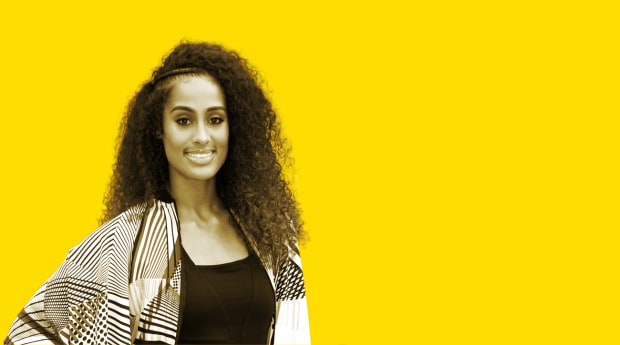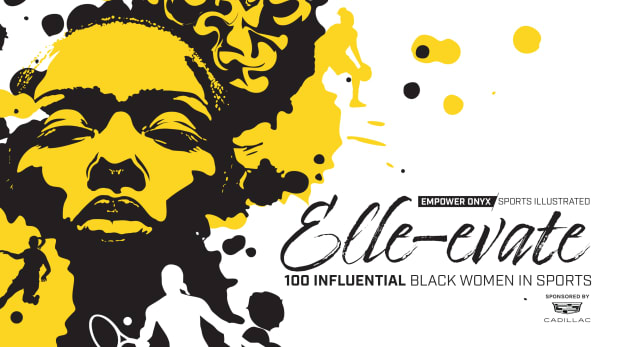
Sports Illustrated and Empower Onyx are putting the spotlight on the diverse journeys of Black women across sports—from the veteran athletes, to up-and-coming stars, coaches, executives and more—in the series, Elle-evate: 100 Influential Black Women in Sports.
That Skylar Diggins-Smith has managed to keep her private life so, well, private, is a social media miracle. The WNBA veteran has been a hot topic for almost two decades, with fans admiring her level of play, leadership and looks—which she chalks up as just being part of the job.
Diggins-Smith usually limits any conversations with those outside of her inner circle to be strictly about business. She doesn’t share much about her home life or family. She’s fiercely protective of her husband, Daniel Smith, and their three-year-old son, Seven, partly because of the scrutiny and hype she failed to escape early in her career.
“I was one of the first to go viral in our sport. And with social media following kids from seventh grade on out, you think it’s good for their notoriety, or their popularity, but really, you’re just putting a big target on their back,” Diggins-Smith says.
The Indiana native first took center stage as a standout with the Washington High School Panthers before leading Notre Dame to three Final Fours in college. Hundreds of fans would mob outside the arenas after the Fighting Irish’s games and follow the team bus for miles. They showed up with gifts, asking for photos with her and even offering marriage proposals.
“It was a lot of love, but it was a lot of hate, too,” Diggins-Smith says.
It was noise—maybe the most destructive opponent a young athlete faces—which can either boost a turbulent ego or shatter all confidence. Diggins-Smith says her family, especially her mom, Renee Scott (a 5’2” former gymnast) kept her spirit and psyche balanced. Scott was just 19 when Diggins-Smith was born, and the hoops star says it was her mom who nurtured her ultracompetitive nature and resilience, as well as teaching her to stay focused on the business of playing basketball, no matter what else was going on around her.
Diggins-Smith says she used to be bothered by hecklers who tried to force her to step outside of her authentic self, but she is better at managing it now.
“I’ve learned people have a certain expectation of how you should act or what you should do based on how they see you. I felt like I was doing back flips and splits so that everyone would like me, but I’ve reached a point now where I know I’m not everyone’s cup of tea,” Diggins-Smith says. “Once I developed that mindset, it relieved a lot of pressure and stress.”
Going pro seemed to intensify the celebrity-like obsession with Diggins-Smith that started in college, and it hasn’t let up since. At 31, she has spent eight years in the league now: She’s a five-time WNBA All-Star and an Olympic Gold medalist, and last season, she came “this close,” she says, to turning her first Finals run with the Mercury into a title. Her success makes her one of the top 10 highest-paid players in the league, raking in close to $2 million this year from her WNBA salary, award money and endorsements. But many, including Diggins-Smith herself, consider that sum to be a pittance compared with what players earn in the NBA.
For years, Diggins-Smith has spoken out about the pay gap between the men’s and women’s professional basketball leagues. Still, she calls herself a realist and says she understands that it will take a little longer to drive higher salaries to the WNBA. The NBA is 75 years old; the WNBA is 25 years old. It’s 50 years behind in working out labor issues and creating a brand identity.
“There are opportunities in the works to bring forth more compensation for women hoopers, and to invest in women’s sports. The WNBA just sold about $75 million in equity to raise money for marketing,” Diggins-Smith says. “Our product is the best it’s ever been, and the level of excitement and entertainment that our game brings is great right now.”
Some argue building stronger WNBA brand awareness isn’t enough to quickly produce the same revenue or interest as the NBA. Twitter and the blogosphere are full of people declaring the only way the WNBA can fill arenas and generate more money is to make the game faster (shortening the court and lowering the basket to allow the players to score more often).
“That’s a lazy argument from a casual women’s basketball fan,” Diggins-Smith says. “Our game is not for them. That’s like if I said the NBA should raise its rim to 11 feet. That would be more exciting, too.”
Many WNBA players choose to supplement their incomes by playing overseas during the offseason, but the extra playing and loss of time off can be difficult to manage. Players lose time with their families and risk returning exhausted or injured.
Diggins-Smith, however, has never played overseas. She says her strategy has been to instead focus on creating additional streams of revenue for herself by building an individual brand here at home.
“I felt like I had to dream bigger. Basketball is the mecca where pop culture and entertainment intersect. Music, fashion, drama, story lines, all that comes together through sports,” Diggins-Smith says.
As the first woman to sign with Jay-Z’s Roc Nation Sports, Diggins-Smith quickly inked several high-profile endorsement deals and became the first women’s basketball player to land a partnership with multinational athletic wear company Puma.
“When I first went with Roc Nation, people gave me a hard time because it was new. I was drawn to them because of two strong women of color: CEO Desiree Perez and Jana Fleishman, the executive vice president of strategic marketing and business development,” Diggins-Smith says. “They were making big boss decisions, taking smart risks and betting on themselves, and I was like, ‘Hell yeah, I want to be a part of that.’”
Fleishman is Diggins-Smith’s agent to this day.
“It's a blessing that, with Jana’s help, I've been able to discover other things and really take the time to focus on marketing myself. I’m working as an on-air analyst with the Phoenix Suns, and that’s allowing me to explore TV and production,” Diggins-Smith says.
This versatility, she says, is in part because of her son and husband. Family time is “nonnegotiable” for Diggins-Smith, and she wants to make sure she is flexible enough to be there for birthdays, holidays and other special moments even as she expands her brand.
“I couldn’t do this job without my husband,” Diggins-Smith says. “Having a partner that’s hands-on, that’s invested, that’s present; it’s underrated, but it’s the most important thing in the world to me.”
The WNBA season is an action-packed, four-month run with 36 regular-season games, plus the playoffs, followed by offseason training, appearances and side hustles.
This past year capped Diggins-Smith’s most successful season, and she marked it with a poignant tweet: 1000+ buckets in the WNBA! I’m DAMN PROUD of all the work I’ve put in and sacrifices I’ve made to be where I am today. Thankful for my inner circle and all the fans who’ve followed me along this journey! I made the little girl from South Bend with big dreams proud! #1000buckets
The star stays busy year-round, but that doesn’t stop her from being just as engaged in what she describes as her most gratifying job: being a mom to Seven.
“He is the best thing to happen to me and my motivation,” Diggins-Smith says. “Just nurturing him and watching him grow into this fearless human, and watching my husband with my son and seeing their core memories being made, it’s like, oh my goodness.”
Diggins-Smith is living the best of both worlds—happy hustle and happy home. Still, she’s the same humble, young woman that Renee raised her to be.
“I don’t take anything for granted. I’m blessed and highly favored, but I still have many goals. I still want to win a championship, that would be the icing on the cake. But for now, I’m going to keep working really hard every day to stick with the habits that have gotten me to this place,” Diggins-Smith says.

Madelyne Woods is a contributor for Empower Onyx, a diverse multi-channel platform celebrating the stories and transformative power of sports for Black women and girls.







